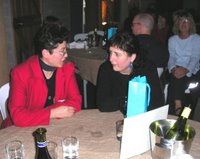 One paper at the Lifelong Learning conference that was very interesting, but that I’ve only got a few notes on was by Mandy Lupton, talking about early findings from her research into music students’ “ways of experiencing the relationship between information literacy and learning.” I’ve not got many notes partly because it wasn’t a paper in the proceedings and partly because I was chairing the session, so I was trying to keep alert as to timing and so forth and trying to think of a question to ask in case non-one else did (but actually there was lots of discussion on this). Mandy’s research shows, like our own, that “information” is experienced very differently depending on which discipline you are working in, and also that there is variation between different people’s experience (she is also using phenomenography as her research approach). So for music students, information can be in sounds and patterns, as well as more conventional sorts of things: therefore also information literacy is experienced differently. I may be seeing Mandy again next week, so I might be able to ask her more then. A book by Mandy that I’ve mentioned before is The learning connection, published by Auslib Press, based on her work for her research masters.
One paper at the Lifelong Learning conference that was very interesting, but that I’ve only got a few notes on was by Mandy Lupton, talking about early findings from her research into music students’ “ways of experiencing the relationship between information literacy and learning.” I’ve not got many notes partly because it wasn’t a paper in the proceedings and partly because I was chairing the session, so I was trying to keep alert as to timing and so forth and trying to think of a question to ask in case non-one else did (but actually there was lots of discussion on this). Mandy’s research shows, like our own, that “information” is experienced very differently depending on which discipline you are working in, and also that there is variation between different people’s experience (she is also using phenomenography as her research approach). So for music students, information can be in sounds and patterns, as well as more conventional sorts of things: therefore also information literacy is experienced differently. I may be seeing Mandy again next week, so I might be able to ask her more then. A book by Mandy that I’ve mentioned before is The learning connection, published by Auslib Press, based on her work for her research masters.Photo by Sheila Webber: Port Julia cliff/beach, South Australia, June 2006.



















